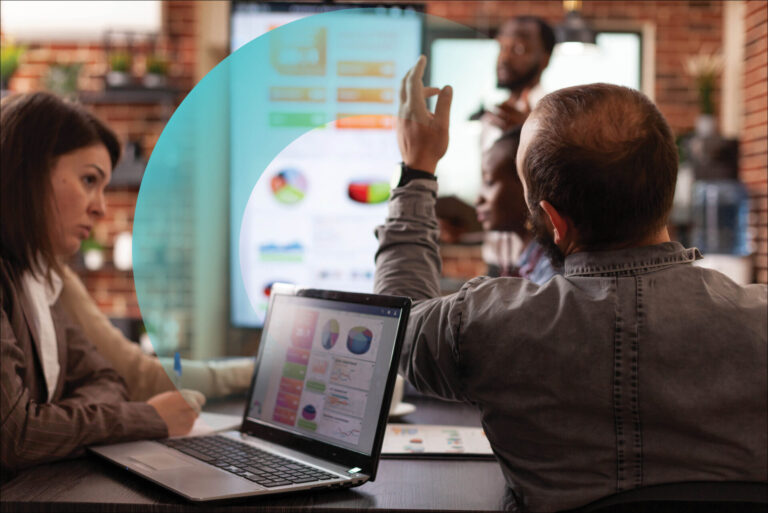Unlocking the potential of AI in the modern workplace: five key use cases
In today’s rapidly evolving technological landscape, Artificial Intelligence (AI) emerges as a transformative tool to reshape the modern workplace. Much like the industrial revolution, the rise of the internet, and the mobile phone, AI promises to revolutionise how we work.
AI is a machine’s ability to perform human-like cognitive functions, including perception, reasoning, learning, problem-solving, and creativity. It comes in various forms and its scope and impact are still unfolding. Recent research from McKinsey estimates that AI’s impact on the economy could add an astounding $2.6 trillion to $4.4 trillion annually across many use cases and business functions, dwarfing the GDP of entire nations. To put this into perspective, GDP of Australia is estimated to hit $1.7 trillion by the end of 2023.
AI is already making its mark, particularly on the knowledge worker. A recent study by Harvard Business Review revealed that consultants using AI, completed 12.2% more tasks on average and were 25.1% faster than their non-AI counterparts. With the potential to automate 60-70% of employees’ tasks over the next decade, AI has the power to fundamentally transform the workplace, with early adopters gaining the competitive edge.
AI applications hold immense promise, particularly across five key areas: well-being and engagement, growth and development, culture and communication, knowledge and expertise, and productivity and collaboration. To prepare for AI’s impact on the future of work, it is essential to understand the implications, existing applications and its potential to drive change within our organisations. Let’s look at some use cases.
Wellbeing and Engagement
The foundation of a thriving organisation lies in the well-being and engagement of its employees. According to a Gallup study, highly engaged teams experience a 41% reduction in absenteeism and a 17% increase in productivity. The World Health Organisation also estimates that depression and anxiety disorders cost the global economy $1 trillion annually in lost productivity.
AI is emerging as a strategic ally in organisational health and wellbeing by crafting personalised well-being strategies tailored to individual preferences and needs. By analysing stress levels, work patterns, and employee feedback, AI-powered systems can recommend mindfulness exercises, relaxation techniques, and work-life balance strategies. By facilitating a healthier and more engaged workforce, AI becomes a catalyst for improved overall well-being, sustained engagement and cost mitigation.

Growth and Development
Professional growth is the cornerstone of a progressive workplace, and AI is introducing an innovative approach to personalised learning that will help keep organisations on top of employees up-skilling. A recent Gartner report found that 70% of employees do not have the necessary skills they need for their current jobs, and a LinkedIn Learning Report shows that 94% of employees would rather stay longer at a company that invests in their career development than ones that do not.
AI can play a critical role in identifying skill gaps, interests, and learning preferences, and suggesting learning opportunities, emphasising the importance of AI-powered personalised learning. By analysing an employee’s current skill set and mapping it against industry trends, AI can recommend relevant courses, certifications, and workshops to bridge those gaps. This approach empowers employees and ensures the organisation remains competitive in a rapidly changing business landscape.
Culture and Communications
Communication and cultural enhancement lie at the heart of a vibrant and successful workplace culture. Deloitte’s Global Human Capital Trends survey supports this theory, revealing that 82% of respondents believe culture is a competitive advantage, and organisations with strong cultures are 1.3 times more likely to outperform their peers.
AI can promote inclusive language and generate content that resonates with the organisational ethos, helping to streamline and embed culture into an organisation. Consider a scenario where a company is celebrating its diversity and inclusion efforts. AI can analyse communication trends and craft inclusive messages to be shared across the organisation’s communication platforms. Its ability to analyse patterns, suggest language that upholds organisational values, and share stories that foster a sense of belonging, reinforces the organisation’s commitment to diversity and strengthens a culture of inclusivity and belonging.
Knowledge and Expertise
Pursuing knowledge is pivotal for sustained organisational growth, and AI adds an unprecedented layer to this by expertly curating and synthesising complex information. IDC predicts that by 2024, enterprises that invest in AI for knowledge management will see a 40% improvement in knowledge worker productivity. Additionally, a McKinsey report suggests that AI could automate up to 30% of working hours by 2030, allowing more focus on strategic activities that leverage expertise.
Consider a scenario where a team compiles a comprehensive report on industry trends. AI can analyse a vast array of data sources and generate a detailed report with the latest insights and analysis. It saves the team time and ensures their efforts are focused on interpreting and applying information rather than manual data collection.

Productivity and Collaboration
The tangible impact of AI on productivity and collaboration is well-documented. New research conducted by Slack suggests staff at companies adopting generative AI tools are 90% more likely to report higher productivity levels, saving about 3.6 hours a week. This equates to approximately a month a year saved due to AI automation. For example, through content, research and design automation, AI frees employees from repetitive tasks, enabling them to focus on more strategic initiatives requiring deep creative and analytical thinking. AI-driven project management tools streamline task allocation, timelines, and resource management and AI-driven integrations seamlessly connect disparate systems, creating a unified ecosystem that optimises workflows, data flow, and interdepartmental communication.
Consider a scenario where a cross-functional team is collaborating on a complex project. AI can facilitate the process by analysing individual team members’ strengths and work patterns and then suggesting optimal team compositions and scheduling strategies for efficient collaboration. This not only accelerates project timelines but also enhances team dynamics and outcomes.

Summary
Over the next decade, Artificial Intelligence will start to emerge as a transformative tool that will transform the modern workplace, whether we are prepared for it or not. By embracing this new technology, organisations can boost well-being and engagement, drive better growth and development, tap into new collective expertise, streamline culture and communications, and enhance productivity and collaboration. The synergies of human potential and AI’s innovative capabilities promise untapped potential. Already, the capabilities of AI are improving the effectiveness of knowledge work, helping employees to be more productive, complete tasks faster, and improve the quality of their work. By integrating AI into future organisational strategies and workflows, organisations can empower their workers even further.
In summary, AI has the potential to help organisations:
- Streamline and automate repetitive tasks
- Personalise well-being and learning strategies for quicker upskilling
- Reduce manual labour and associated costs
- Enhance professional growth through tailored learning
- Improve productivity and informed decision-making
- Better align employees with organisational values and culture
The AI space is moving quickly and we are yet to see how it will truly evolve in the modern workplace; however, the impact it is having today cannot be ignored. To fully realise the potential of AI, organisations must remain agile and responsive to drive growth and development. Like the Industrial Revolution, mobile phones and the internet, embracing AI will become less about adopting a tool and more about adopting a forward-thinking mindset.
Stewart Brand once said, “Once a new technology rolls over you, if you’re not part of the steamroller, you’re part of the road”. Effectively, those who learn to harness its power will lead the way for the future of work, and those who don’t will be left behind.
Consider this: In ten years, will people be saying ‘there is an APP for that?’, or will they say, “There is an AI for that?”.
Resources
- The economic potential of generative AI: The next productivity frontier, McKinsey Digital, June 2023
- Navigating the Jagged Technological Frontier: Field Experimental Evidence of the Effects of AI on Knowledge Worker Productivity and Quality, Harvard Businesss School Technology & Operations Mgt. Unit Worker Paper, Sep 2023
- What is AI, McKinsey & Company, April 2023
- Employee Engagement vs Employee Satisfaction and Organisational Culture, Gallup, April 2027
- The path to opportunity is changing, 2018 Workplace Learning Report, LinkedIn, 2018
- Generative AI and the future of work in America, McKinsey Global Institute, July 2023
- Slack says automation can save every employee a month of work per year, ITPro, May 2023
- IBM GLobal AI Adoption Index 2022



